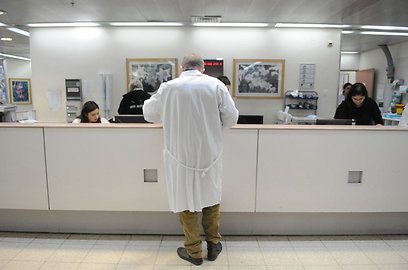
Finance proposes to cut hospitals' senior management
Draft of Treasury's Arrangements Law limits tenure of hospital administrators to six years. Ichilov, Sheba managers, likely to lose jobs, refer to draft as 'vindictive, intended to harm those who have protected public hospital system'
The Chaim Sheba Medical Center at Tel Hashomer and the Tel Aviv Sourasky Medical Center said they believed the move was designed to bring the dismissal of their hospital administrators, professors Zeev Rotstein and Gabi Barbash, respectively. Finance also intends to appoint a controller to each hospital, and to limit the amount of donations a hospital may accept.
Related stories:
- New immigrant doctors unsatisfied with salaries
- Law to cut funding of haredi schools
- Complaining of exploitation, nurses launch strike
Prof. Zeev Rotstein, who has held his position since 1999, and Prof. Gabi Barbash, who began his term six years ago, published a joint response: "We are deeply worried by the Treasury's Arrangements Law, which has been put before the Knesset. The proposal is the final nail in the coffin of the public hospital system in Israel.
"The vindictive section aimed at hospital administrators which harms those who defended the public hospital system is the least harmful section in the Treasury's Arrangements Law, proposed by Moshe Bar Siman Tov, the Deputy Budgets Commissioner," the statement continued.

Barbash (L) and Rotstein (Photos: Naama Gibori, Sheba Medical Center)
According to the two senior administrators, "The message sent in the bill is canceled second shifts at government hospitals, long lines, and the referral of thousands of patients to the private system, taking control of hospitals away from management, leading to bankrupt hospitals, and to the dismissal of thousands of employees."
German and Lapid (Photo: Moti Kimhi)
The draft of the Arrangements Law applies this rule to senior administrators at the Health Ministry, and its offshoots as well. Additionally, an administrator who has completed his term will not be able to continue being employed at the hospital he managed. According to the proposal, an administrator who had previously served as a director, will not be considered for the position again in the future.
"Ricky Cohen will pay greatly due to Treasury"
Representatives of Sheba and Ichilov argued, "It should be remembered that the same policy of the Budget division is responsible for the prosperity of private health care in the State of Israel, even as it squeezes more and more money from citizens, empties public hospitals of doctors and patients, and leaves Ricky Cohen paying huge amounts for services to which she is entitled by law.

Kaplan Medical Center in Rehovot (Photo: Ohad Zwigenberg)
"The Budget division is responsible for the fact that the supplementary insurance money we pay is destroying the public hospital system," they continued.
Another item that may garner objections of the Health Ministry concerns donations. According to the law's draft, a hospital will not be able to accept charity, unless it meets the following criteria: the establishment of an internal oversight committee, and the following of ethics rules detailed in the law's proposal. Among other things, the committee will ensure that donations will not be used to pay salaries, or for construction projects. Also, it will be forbidden to accept donations which obligate the hospital to be in contact with a service provider.
It was also proposed that hospitals not be able to accept donations that cause them future burden or additional expense. This means, for example, that it will not be possible to accept contributions for construction projects which are not pre-approved by the Finance Ministry or the Minister himself.
Hospital administrators: We will block law's passage
Professor Rafi Beyar, General Director of Rambam Health Care Campus in Haifa, described the draft of the Treasury's Arrangements Law as "the death blow to the Israeli public health care system."
According to Beyar, "Today we are working with a serious shortage in equipment, budgets and huge turnover in personnel. For years, there has been no increase in public budgets. Over the past two years, we have witnessed only a minimal increase, which definitely does not meet the continually growing needs. The hospital that I manage is in a deep financial crisis. The nurses are collapsing and when a person retires, I cannot appoint a replacement, because there is none."

Medical staff at Wolfson (Photo: Yaron Brener)
Professor Beyar noted that this refers to the draft only, and said that he and his colleagues will fight together to ensure that the law is not enacted. "We will meet with the Ministry of Health after we have met with Minister German," he said. "We are at the discussions stage, and I do not believe the law will pass in its current format. We do not want to return to third world medicine. Already today, people have been waiting months for surgery, and we do not want this to become years."
Dr. Yitzhak Berlowitz, director of the Edith Wolfson Medical Center in Holon and the former Deputy Director General of the Health Ministry commented sarcastically, "We know the ritual. Every year the Finance Ministry transfers lists of ideas, some of which are not new. Those which were rejected for good reason, and new ones as well, would not necessarily have positive impact on the health care system."
According to him, limiting tenure of hospital administrators might cause doctors who posses the skills and training to manage hospitals, to not want to do so in fear that at the end of the period, they might not find fitting employment.

Heart Building, Ichilov, funded by donations (Photo: Miri Gattenyo)
"He will not be able to manage, as he has completed his tenure, but on the other hand he will not return to clinical practice eight years later, after having moved from practical medicine to medical adminsitration," said Dr. Berelowitz. "What do people expect someone who is older and at the peak of his career to do next?"
Berlowitz was also against the proposal that a representatives of the Finance Ministry serve as financial controller of each hospital. "On one hand," he said, "they require the hospital to be an economic body that acts for the benefit of patients and their medical needs; on the other, they are appointing a Finance representative to manage hospital funds. This type of management can negatively affect medical treatment, because Finance employees do not possess the skills and knowledge required to understand medical needs."
He claimed that "no one has shown existing management methods to be ineffective. The case is the opposite. We are among the most effective of all the OECD nations. The amount the state spends on health services is very low in relation to the GDP and per capita, while on the other hand, our medical results are the best. So why fix something that is not broken?"
"On the surface, it appears that the proposals could cause more harm than benefit. These decisions do not improve the system, but harm the status of hospital administrators, as well as the status of the Health Minister," added Berlowitz.
Ahiya Raved contributed to this report
- Receive Ynetnews updates directly to your desktop











